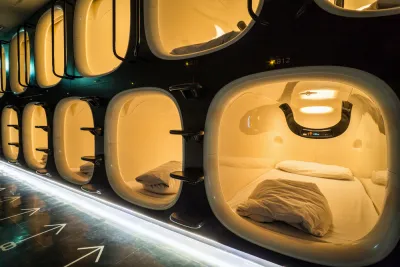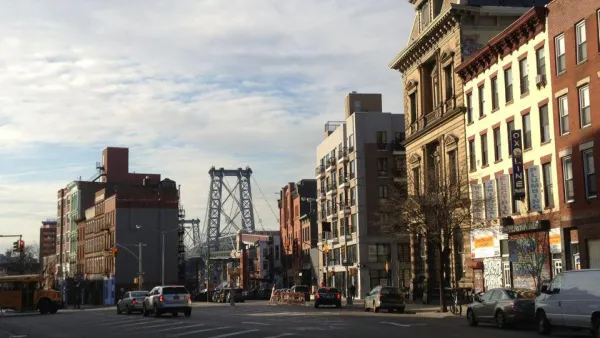Like Japan’s capsule hotels, the ‘podsharing’ housing model offers minimal, shared living space—but can it work as a long-term housing solution?

Dystopian nightmare or clever solution to the housing crisis? That’s the question many are asking about ‘sleeping pods,’ writes Robyn Griggs Lawrence in Smart Cities Dive.
“Sleeping pods were introduced in 2012 by Los Angeles-based co-housing company PodShare as a low-cost alternative for travelers and digital nomads in Los Angeles. They have evolved to become a potential solution to the severe housing shortage gripping California and the rest of the nation.” The concept originated with Japan’s popular capsule hotels and has proliferated at airports around the world. A San Francisco podsharing house charging $1,200 per bed sold out as soon as it opened in what the website 7x7 called “a depressing new low in San Francisco housing.”
As Griggs Lawrence points out, “The pods aren’t without detractors. On Reddit, one user called them ‘the dystopian future,’ and another compared them to living on a warship. Futurism staff writer Victor Tangermann called the pods ‘an extremely expensive prison cell.’”
Nevertheless, the need for affordable rental housing is greater than ever. “In October 2021, 49% of Americans said the availability of affordable housing was a major problem in their local community, according to Pew Research, and the vacancy rate for rental units has fallen from about 10% in 2010 to 5.6% at the end of 2021.”
Jill Pable, a professor and chair of the Department of Interior Architecture and Design at Florida State University, calls the podsharing model “an interesting outcome based on a whole series of new constraints and opportunities that are causing a lot of pain and anguish,” but wonders if “it can provide residents with dignity, empowerment, personal space and privacy” that are essential to human well-being.
FULL STORY: Sleeping pods: coming to a high-rent neighborhood near you?

Analysis: Cybertruck Fatality Rate Far Exceeds That of Ford Pinto
The Tesla Cybertruck was recalled seven times last year.

National Parks Layoffs Will Cause Communities to Lose Billions
Thousands of essential park workers were laid off this week, just before the busy spring break season.

Retro-silient?: America’s First “Eco-burb,” The Woodlands Turns 50
A master-planned community north of Houston offers lessons on green infrastructure and resilient design, but falls short of its founder’s lofty affordability and walkability goals.

Test News Post 1
This is a summary

Analysis: Cybertruck Fatality Rate Far Exceeds That of Ford Pinto
The Tesla Cybertruck was recalled seven times last year.

Test News Headline 46
Test for the image on the front page.
Urban Design for Planners 1: Software Tools
This six-course series explores essential urban design concepts using open source software and equips planners with the tools they need to participate fully in the urban design process.
Planning for Universal Design
Learn the tools for implementing Universal Design in planning regulations.
EMC Planning Group, Inc.
Planetizen
Planetizen
Mpact (formerly Rail~Volution)
Great Falls Development Authority, Inc.
HUDs Office of Policy Development and Research
NYU Wagner Graduate School of Public Service




























